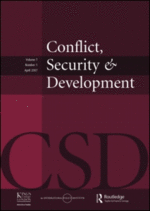Scholars and policy-makers now recognise the security risks posed by refugee militarisation, including the spread of civil war and regional destabilisation. These analysts pay little attention to the militarised exiles once they return home. Instead, repatriation is uncritically accepted as the most desirable solution to refugee crises and as a prerequisite for post-conflict peace-building. Undoubtedly, the vast majority of the refugees desire a peaceful and stable return home. For the minority of militarised exiles, however, return may facilitate a continuance of their programme of political violence. This article examines whether and how previously militarised refugees engage in political violence upon return. It does this by tracing five decades of forced migration in Rwanda, paying particular attention to the Tutsi exiles in Uganda and their eventual militarised return. In the Rwandan case, leaders relied on the mechanism of socialisation, defined as transformative learning and the development of new worldviews, to achieve their goals. Such socialisation operated in exile to form the Tutsi exile army and later functioned as a tool for the coercive imposition of political control in Rwanda.
Lischer, Sarah (2011) Civil War, Genocide and Political Order in Rwanda: Security Implications of Refugee Return, Conflict, Security & Development 11 (3): 261–284.







